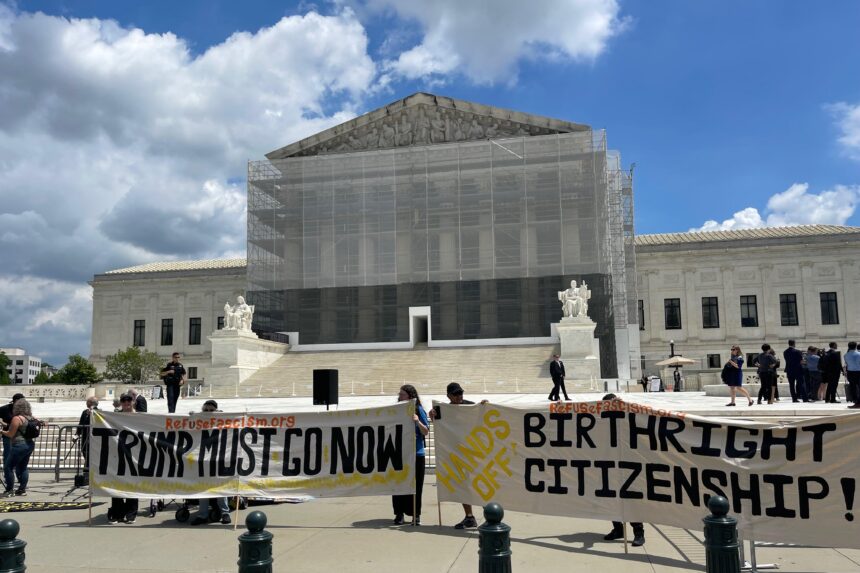Supreme Court Examines Birthright Citizenship: Key Insights and Future Implications
Constitutional Foundations Under Scrutiny in Supreme Court Hearings
The Supreme Court recently engaged in a landmark case questioning the constitutional validity of birthright citizenship in the United States, igniting widespread discussion on immigration and citizenship policies. During the hearings, justices delved deeply into the 14th Amendment’s language, particularly the phrase “subject to the jurisdiction thereof,” debating its original meaning versus its application in today’s diverse society. This judicial examination highlighted a clear divide: some justices advocate for a strict originalist interpretation rooted in 19th-century context, while others support a more dynamic understanding that reflects modern immigration challenges.
This debate underscores the intricate relationship between birthright citizenship and broader themes such as national sovereignty, federal versus state powers, and the evolving nature of American identity.
- Originalist Interpretation vs. Contemporary Context: The Court wrestled with whether citizenship rights should be confined to the framers’ intent or adapted to current demographic realities.
- Federal-State Power Balance: Discussions revealed tensions between federal jurisdiction and states’ roles in citizenship regulation.
- Potential Legal and Policy Shifts: The ruling could trigger notable changes in immigration and citizenship frameworks nationwide.
- Reexamination of Historic Case Law: The Court revisited precedent-setting decisions to guide its constitutional analysis.
- Human Impact Considerations: Justices acknowledged the profound effects on families and communities born into this legal uncertainty.
Consequences for Immigrant Populations and Legal Doctrine
The Supreme Court’s deliberations carry profound implications for immigrant families throughout the country. A decision limiting birthright citizenship could create a vulnerable group of children born on U.S. soil who lack clear citizenship status, potentially rendering them stateless.This legal ambiguity threatens to disrupt access to essential services such as healthcare, education, and legal protections, thereby destabilizing immigrant households economically and socially.
Furthermore, the case challenges entrenched legal interpretations of the 14th Amendment, which has long guaranteed citizenship to anyone born within the United States.A shift in this doctrine could not only reshape immigration law but also influence broader civil rights protections.Central legal principles at risk include:
- Jus Soli (Right of the Soil): Citizenship granted by birthplace rather than parentage.
- Equal Protection Clause: Safeguarding fair treatment for all individuals under the law.
- Stability of Legal Precedents: Whether longstanding judicial interpretations should be upheld or revised.
| Area of Impact | Potential Consequences |
|---|---|
| Citizenship Clarity | Ambiguity for children born to undocumented or non-citizen parents |
| Access to Rights | Possible reduction in eligibility for social services and legal protections |
| Community Integration | Heightened risk of social exclusion and marginalization |
| Judicial Consistency | Potential overturning of established Supreme Court rulings |
Anticipated Changes in Immigration Enforcement and Policy
The Court’s recent discussions have sparked predictions of ample modifications in immigration enforcement and policy interpretation. Should the ruling curtail birthright citizenship, it may pave the way for more stringent immigration controls, affecting not only citizenship rights but also border security, visa issuance, and deportation priorities. This could signal a shift toward a more restrictive immigration regime.
Stakeholders on both sides expect legislative and regulatory adjustments that might include:
- Stricter Verification Procedures: More rigorous checks to confirm citizenship claims at birth.
- Heightened Enforcement: Increased monitoring and policing at borders and within communities.
- Revised Naturalization Standards: Tougher eligibility requirements for citizenship and related benefits.
| Policy Change | Expected Outcome |
|---|---|
| More Restrictive Birthright Criteria | Fewer automatic citizenship grants for children of undocumented immigrants |
| Expanded Border Enforcement | Increased deportations and border patrol activities |
| Enhanced Documentation Scrutiny | Stricter identity verification in public services and benefits |
Calls for Legislative Clarity to Resolve Citizenship Ambiguities
Legal scholars and policy analysts stress the urgent necessity for Congress to provide clear statutory guidance on birthright citizenship. The Supreme Court’s current examination exposes gaps and ambiguities that, if left unaddressed, could lead to inconsistent judicial rulings and legal uncertainty. Lawmakers are urged to craft precise legislation that upholds the 14th Amendment’s core principles while adapting to contemporary immigration realities.
Experts highlight several critical legislative priorities:
- Establishing unambiguous criteria for citizenship at birth to prevent conflicting court decisions.
- Clarifying citizenship status for special cases, including children of foreign diplomats, unauthorized immigrants, and those born during transit through U.S. territory.
- Balancing constitutional protections with national security and immigration enforcement concerns.
Conclusion: Navigating the Future of Birthright Citizenship
The Supreme Court’s ongoing review of birthright citizenship highlights the enduring complexity and meaning of this constitutional issue. The insights drawn from the hearings reveal the multifaceted legal, social, and political challenges at play. As the nation awaits a decisive ruling, the outcome promises to redefine the foundational concepts of citizenship, identity, and belonging enshrined in the 14th Amendment, with lasting effects on millions of Americans and the country’s immigration landscape.









